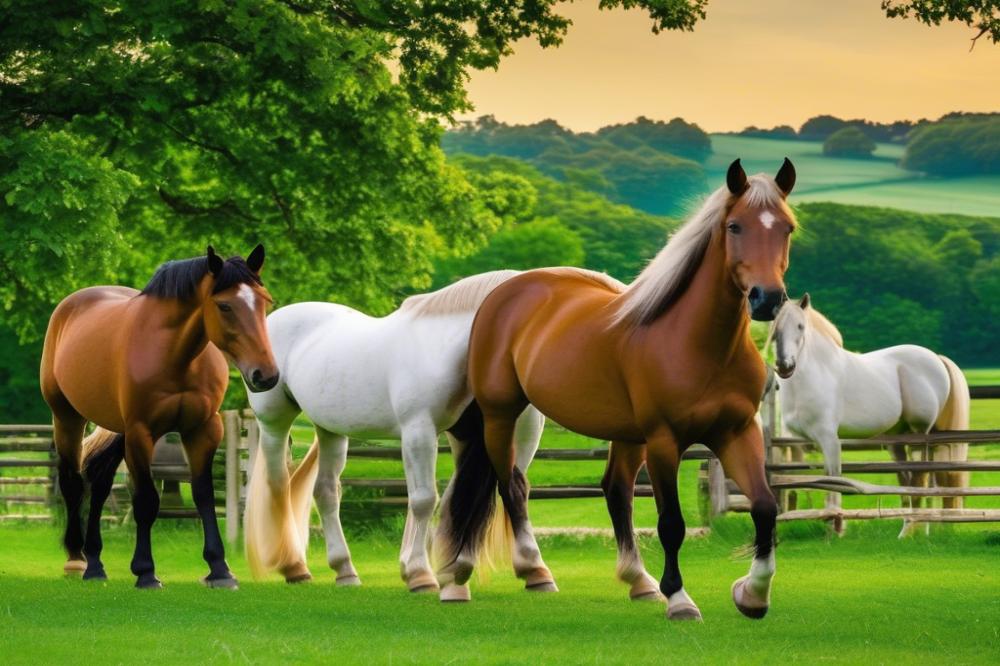Understanding Genetic Disorders in Horse Breeding
Horse Breeding stands out as a fascinating yet complex field. Every horse carries a set of traits passed down through generations. However, some of these traits can lead to Genetic Disorders. Knowing about these issues is crucial for breeders, veterinarians, and horse owners alike. The well-being of these animals can be greatly affected by health problems linked to their genetics.
Focusing on how these disorders impact horse health is essential. Affected horses may experience physical limitations, behavioral issues, or reduced lifespan. These health concerns ripple through breeding practices as well. Breeders often struggle to maintain quality while managing inherited diseases. This challenge can lead to hard decisions about which horses to breed or retire.
This article aims to shed light on effective approaches for prevention and management of genetic health issues. Identifying and understanding potential problems can help safeguard future generations of horses. Through careful selection and informed practices, breeders can promote healthier lineages. The goal is clear: to equip readers with strategies that protect the vitality of horse breeding. Everyone involved has a role to play, and awareness is the first step towards creating a healthier future for these magnificent animals.
Understanding Genetic Disorders in Horses

Genetic disorders refer to health problems in horses that arise from abnormalities in their DNA or genes. These issues can be inherited from one or both parents, leading to a range of conditions. Such disorders can affect the overall health, performance, and well-being of the animal.
Common Hereditary Diseases in Equine Genetics
Several hereditary diseases can impact horse breeds. For instance, Hyperkalemic Periodic Paralysis (HYPP) affects muscle function and can lead to sudden muscle weakness. Another notable illness is Genetic Martin Sickness, which can cause profound nervous issues. Additionally, Severe Combined Immunodeficiency (SCID) is a fatal condition that impedes the immune system’s ability to fight infections.
These conditions are examples of how genetics can create significant challenges in breeding practices. Understanding their prevalence in certain breeds is crucial for responsible breeding. The Arabian horse breed is particularly known for having a higher risk of HYPP and SCID.
How Genetic Diversity Affects Horse Health and Breeding
Genetic diversity plays a significant role in the health of horse populations. A diverse gene pool can reduce the chances of hereditary diseases manifesting. When breeders prioritize diversity, they may help mitigate the effects of harmful genetic traits. Limited genetic variation often leads to a concentration of particular diseases within certain breeds.
Maintaining a heterogeneous breeding program can enhance overall resilience in horses. Animals that are bred from varied genetic backgrounds tend to be more robust and adaptable. This principle applies not just to physical traits but to behavior and overall vitality as well.
The Role of Genetic Testing

Genetic testing plays a crucial part in horse breeding. It helps breeders identify potential disorders in horses before they affect the animals’ health. By knowing the genetic makeup of a horse, breeders can prevent serious health issues and ensure healthier offspring. Discovering genetic vulnerabilities allows for better management of breeding practices.
Types of Genetic Tests Available for Breeders
Various types of genetic tests are accessible to horse breeders. Some tests focus on single nucleotide polymorphisms (SNPs) which can reveal specific traits. Others analyze whole genomes, providing a broader view of a horse’s genetic health. Carrier tests help determine if a horse carries genes for particular disorders. Breeders can also use parentage tests to confirm lineage, which is vital for maintaining breed integrity. Each test serves different purposes, helping breeders make informed choices.
Interpreting Genetic Test Results and Making Informed Breeding Decisions
Reading and understanding genetic test results is essential for successful breeding outcomes. Test results can indicate whether a horse carries a harmful gene, is a carrier, or is free of known issues. Knowing this information allows breeders to make decisions based on risk factors. Pairing a carrier with a non-carrier may reduce the likelihood of passing on disorders. Consideration of traits, performance metrics, and temperament is also important when making breeding choices. Each breeding decision impacts the future health and performance of horses, underscoring the need for thoughtful interpretation.
Health Screening and Management Strategies

Establishing robust health screening practices for breeding stock is crucial. Routine veterinary examinations can identify potential issues early. This may involve testing for specific genetic markers associated with known conditions. A thorough evaluation helps breeders make informed decisions about which animals should be included in their breeding programs.
Keeping a close watch for signs of hereditary diseases is equally important. Breeders should be familiar with the symptoms associated with common disorders in their horses. Observing horse behavior, physical traits, and overall health can provide valuable insight. If any irregularities are noted, veterinary consultation should follow without delay.
Creating a comprehensive management plan for horses that may be at risk holds great importance. Such a plan should include regular veterinary check-ups, nutritional guidance, and exercise regimes tailored to individual needs. Proper documentation of health history can aid in tracking any emerging trends or issues. Additionally, breeders should educate themselves on the latest genetic research to apply best practices. Teaming up with geneticists or equine specialists can enhance understanding and decision-making.
Strategies for prevention can range from selecting breeding pairs wisely to implementing sound practices in care. Ensure all breeding animals undergo genetic screening where applicable. Keeping records of any genetic conditions in progeny aids in tracking and reducing risks in future generations. Engaging with other breeders to share knowledge can foster a supportive community focused on animal health.
Finally, remaining adaptable in management approaches is key. Breeders may need to adjust strategies as new information comes to light. Regularly reviewing the management plan helps address any changes in the horse’s health or genetics. Proactively managing potential risks will support healthier breeding practices.
Responsible Breeding Practices
Responsible breeding refers to the careful selection of breeding horses to promote health and maintain the well-being of future generations. Understanding the genetic background of each horse is essential in this process. Every breeding decision should be made with consideration of the horse’s lineage. When planning to breed, it is crucial to assess the potential risks of passing on hereditary conditions.
Guidelines for Selecting Breeding Pairs
In order to minimize the chance of genetic disorders, breeders should start with a thorough evaluation of candidates. Choosing mates with diverse genetic backgrounds can help lower the risk. Each horse’s health history must be reviewed, particularly focusing on any known conditions within their family tree. Breeding pairs should complement one another in terms of strengths and weaknesses. Genetic testing can provide valuable insight into inherited traits, guiding decisions toward healthier outcomes.
Importance of Maintaining Genetic Diversity
Maintaining genetic diversity is vital for the overall health and longevity of horse breeds. A genetically diverse population is less likely to experience the effects of inbreeding. It helps prevent certain diseases and enhances the overall vigor of the offspring. Breeding programs should promote a mix of genetics rather than favoring a popular line. By keeping bloodlines varied, breeders can promote healthier horses that are better equipped to thrive in different environments.
Preventive Measures and Future Trends
Reducing genetic disorders requires careful planning in horse breeding. Breeders can implement several strategies to lower the risk of inherited conditions. Genetic testing before breeding can identify carriers of specific disorders. This knowledge helps to make informed decisions about which horses to mate. Only by choosing healthy horses can the chances of passing on issues be minimized.
Guidelines for breeding pairs should be based on their genetic backgrounds. Creating detailed records of lineage helps in understanding potential risks. Breeding for genetic diversity is crucial as well. The more varied the gene pool, the lower the likelihood of disorders. Various breeding strategies can promote this diversity and contribute to healthier foals.
Innovations in Equine Genetics and Future Research Directions
Advancements in equine genetics show promise for the future of horse breeding. New technologies, such as genome sequencing, allow researchers to explore horse DNA in great detail. This method opens the door to discovering more about genetic traits and disorders. Researchers are constantly looking for markers that indicate health risks. Identifying these markers can lead to better breeding choices and healthier horses overall.
Future studies may focus on developing safe gene-editing techniques. Such innovations could correct genetic faults before they manifest in offspring. As science advances, so too does the potential for cultivating highly resilient breeds. Investing in research on equine genetics will undoubtedly change the landscape of horse breeding.
Ethical Considerations in Horse Breeding and Genetic Management
Ethics plays a significant role in breeding decisions. Breeders must balance their desire for certain traits with the welfare of the horse. Prioritizing the health and well-being of animals is essential. Choosing to breed solely for appearance can lead to serious health issues. Each horse has its own value, and that must be acknowledged.
Questions surrounding genetic manipulation arise as technology evolves. Society must grapple with the implications of altering an animal’s genetics. Open discussions about the ethics of breeding practices are becoming increasingly important. It’s vital for breeders to work with veterinarians and geneticists. This collaboration can foster responsible breeding decisions, promoting the health of the breed while also maintaining high standards of ethics.
Final Thoughts
In summary, breeding horses with a focus on health and wellness is vital. Knowledge about the various hereditary disorders can guide breeders toward making informed choices. Implementing preventative measures is key. Careful selection of breeding pairs helps reduce the risk of passing on undesirable traits.
Education plays a crucial role in this process. Understanding the genetic backgrounds of horses allows breeders to make better decisions. Awareness of specific disorders can lead to wiser pairings and proactive strategies. Regular screenings may uncover potential issues before they become severe. Staying informed about the latest research is essential in this field.
All breeders should prioritize the overall health of their equine companions. Responsible practices not only protect the animals but also enhance the reputation of the breed. Vigilance is important as it helps catch any signs of illness early. Patience and thoroughness will go a long way in fostering healthier generations of horses.
By placing an emphasis on responsible management, breeders can promote the well-being of their horses. Whether through genetic testing or ongoing education, every step counts. An investment in understanding will pay off in healthier, happier horses. Let’s work together to ensure a promising future for equestrian pursuits.



